Does your car squeal or squeak when you depress the brake pedal? The common thing that comes to the mind of motorists is worn brake pads.
While this is a potential cause, there are several reasons a car squeaks when braking.
This high-pitched annoying and embarrassing squeaking noise shows underlying issues in the brake system components.
Sometimes, the squeaking noise is temporary and doesn’t need any action from you.
It could be a normal noise that comes after fixing a new brake pad that’ll go away after some time. It can also come after a night of rainfall.
Other times, squeaky brakes project imminent mechanical issues on the brake pads, brake rotors, or calipers. If the noise disappears after some time, it’s nothing to worry about.
But If it continues or even gets worse, it indicates a problem that needs urgent attention.
Here, we’ll discuss what could cause a squeaking noise when depressing the brake pedal.
Reasons Your Car Squeaks When Braking
Whatever the reason is, don’t panic. You only need to find the reason on time and fix it before it escalates to significant brake failures. Here are the probable causes.
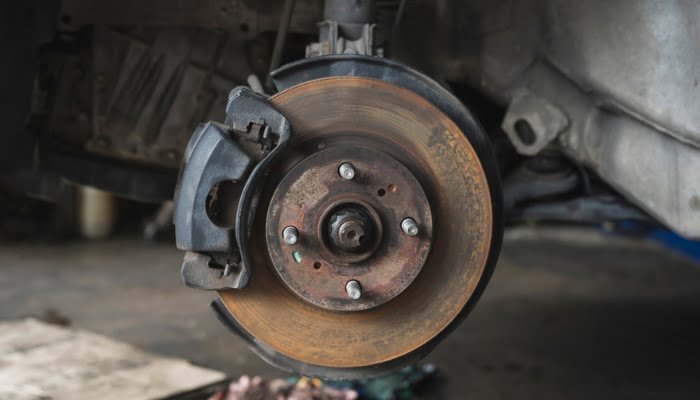
1. Worn or Rust Rotors
If you park your vehicle outside a garage overnight during rainfall, the brake rotors may accumulate dirt.
If this dirt and sand stay on the rotor surface for a couple of days without driving the vehicle, it’ll cause squeaky brakes.
Brake rotors wear over time and lose their smoothness, which could cause squealing noise. That said, squealing brakes could be a wear indicator.
Smoothing off the layer of rust on the rotor will fix the noisy brake. If the wear is too much, it may require replacing the rotors with new ones.
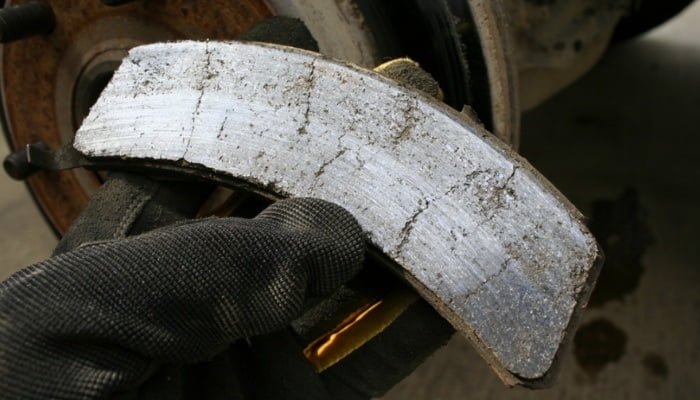
2. Worn Brake Pads
If it has been a long since you replaced your brake pads, squeaky brake noise may mean the disc brakes are wearing off.
There’s a metal tab on the brake pads. These metal tabs rub on the disc or rotors when it’s wearing more than they should.
The rubbing will cause a squeaky noise to notify you to change the brake pads before they wear down completely and damage other brake components.
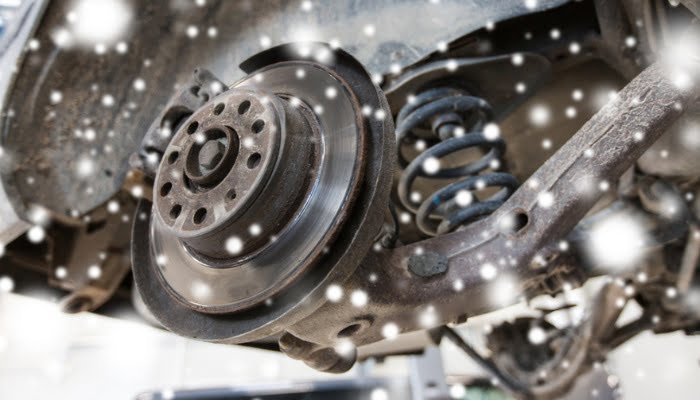
3. Overnight moisture
If your car makes an unusual sound when you start it up in the morning, even if you park it outside overnight during rain, humidity, or snowfall, it’s not necessarily abnormal.
Rainfall or snow may cause a small layer of surface rust to form on the brake pads. If this happens, it could result in annoying noises when you press down on the brake pedal.
Luckily, the vehicle doesn’t require any brake jobs. The grinding or squealing noise will disappear under normal driving.
I recommend parking your car in a garage to avoid accumulating moisture on the brake drums and disc.
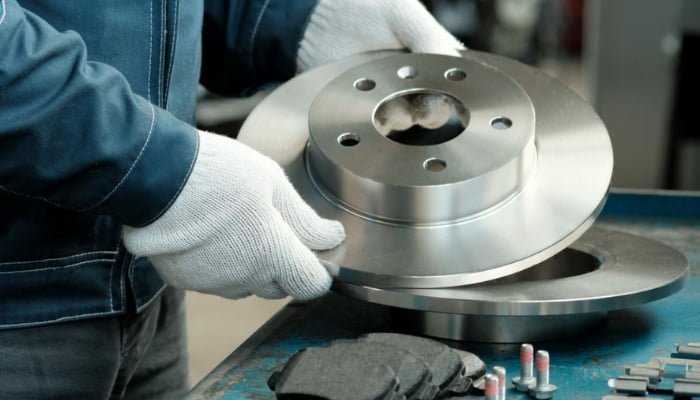
4. Metallic Brake Pads
The brake pad material can cause an annoying sound in the vehicle.
Yes, there are different types of brake pads. Organic, ceramic, and semi-metallic brake pads.
Semi-metallic is the common type of brake pad on the market shelves. Manufacturers produce them with some elements of graphite, copper, steel, and iron.
This type of brake shoes and pad causes occasional grinding or squealing noise. When it wears beyond that particular spot, the noise will seize.
However, you can replace the brakes if the grinding noise is disturbing you.
While organic brake pads are quite affordable to all motorists, their performance and durability are compromised. They wear faster than semi-metallic and leave brake dust on the wheel.
In contrast, ceramic brakes are the best among the three. They are costlier than the other two, and also offer better performance and longer durability.
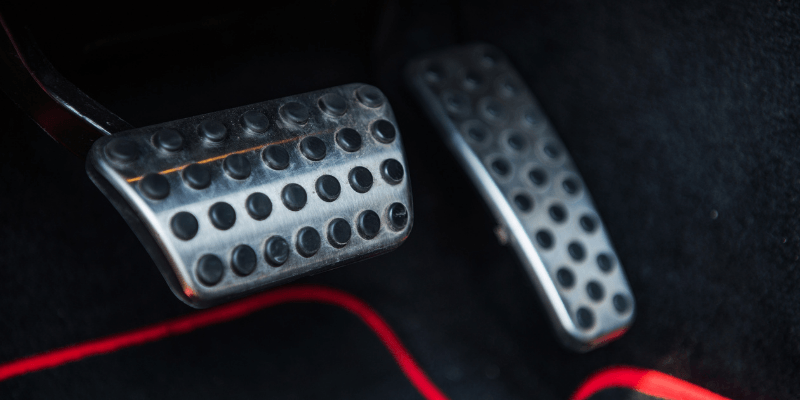
5. Hard Braking
Your braking style can be the reason for that squeaky noise you hear when breaking.
Frequent hard and swift braking, especially when coasting at high speed, will cause overheating on the brakes, disrupting the smooth brake pad and rotor surface.
This method of breaking will cause glazing on the brake pad surfaces.
Riding on brakes, especially when driving downhill, can also cause glazing on the brakes.
Constant brake application will cause excessive heat on the brakes. This extra heat will glaze the brakes.
Glazed brakes will no longer stop the vehicle effectively as it is designated to. The brakes may fracture or crack. The only option is to replace them.
It’s essential to note that a mechanical or hydraulic failure in the brake caliper can put pressure on the brake pads against the rotor even when you’re not applying brakes.
This can be the culprit of glazing brakes. This is dangerous because it happens without the driver’s knowledge.
To carry out a brake inspection on glazing brakes, rub your fingers on the surface of the brake pads.
It should be smooth and glossy. Before replacing glazed brakes, inspect the rotors and resurface them.
Also, inspect other brake components for hydraulic and mechanical failures. If you keep having glazing brake issues, consider changing your braking styles.
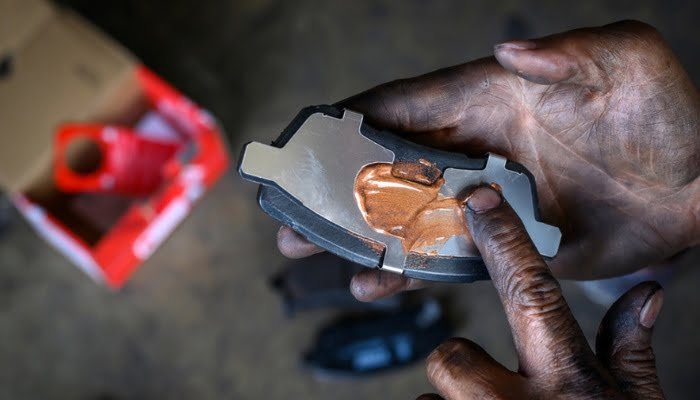
6. Lack of Lubrication on Drum Brakes
If your rear brakes use shoe brakes, the squealing noise may come from the contact point between the drum and the shoe brake.
Improper lubrication can cause the shoes to scrape against the backing plate.
This problem is quite easy to diagnose and fix. The scraping surface will look shiny and easy to spot.
To prevent or repair them, disassemble the drum and apply brake grease on the edge of the brake pot where the shoes rest.
FAQs
How do I get my brakes to stop squeaking?
The best solution to stop squealing brakes is to track and fix the culprit since there are different causes of squeaky brakes.
However, the common cause of squeaking when braking is worn-out brake pads. If this is the cause in your case, remove the pads and smooth or replace them.
Can dirty brakes cause squeaking?
In disc braking systems, moisture, humidity, or dirt can get trapped between the pads and the brake disc, and cause uneven and squeaky braking.
Whereas, in drum brakes, dust can accumulate inside the drum from the adjustment port and cause squealing and uneven braking. In such cases, you’ll only have to inspect and remove the accumulated debris.
Will squeaky brakes go away?
If you park a vehicle outside a garage overnight under rainfall, humidity, or snow, the squeaky brake noise should go away on its own. However, if the noise continues for a longer period whenever you apply the brakes, there’s a more serious case that needs urgent attention.
Track the culprit and fix it before it escalates to other braking components and drop expensive repair bills on the table.
How many miles can you drive with a squeaky brake?
Depending on the heavy loads the vehicle carries and how often you use them, squeaky brakes can travel around 2,000 miles.
However, it’s important to check and fix the culprit once your vehicle starts squeaking.
Overusing worn braking pads and shoes can warp the rotors and the brake drum, making the brakes ineffective and exposing you to danger. You don’t want to endanger your life for anything. Therefore, fix squeaky brakes the moment you notice the noise.
Can low brake fluid cause squeaks?
When a vehicle runs low on brake fluid, brake applications will not put the same amount of pressure on the brake shoes and pads. This will cause uneven brake wear.
In turn, the car will give a grinding, squeaking, and squealing noise when you apply the brakes. The vehicle may rumble and vibrate when braking.
Final Words
At this juncture, we’ve provided reasons your car squeaks when braking and answer some frequently asked questions on this subject.
Overall, a squeaky brake shows its time for inspection and maintenance. Unless you understand brake working principles and how to diagnose them, contact a certified mechanic to diagnose and fix the vehicle.



